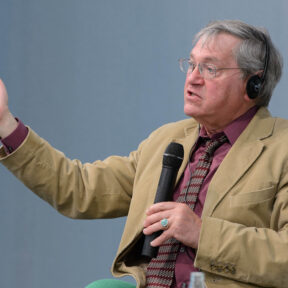
Michael Klare
: Photo from Creative Commons / Author of Photo: boellstiftungOverview
* Professor of Peace and World Security Studies
* Former director at the Institute for Policy Studies
* Served on the advisory board of the Arms Division of Human Rights Watch
* Participated in the “Iraq panel” at the 2003 Socialist Scholars Conference
* “The U.S. rush to judgment in Iraq – one could say the frenzy to bomb – is the product of a deeper psychosis in American foreign policy.”
Michael Klare has the title of Five College Professor of Peace and World Security Studies” (PAWSS), which is a joint appointment at five Massachusetts schools: Hampshire College, Amherst College, Smith College, Mount Holyoke College, and the University of Massachusetts at Amherst. Klare has been an outspoken critic of the War in Iraq, charging that American foreign policy is not intended to quell foreign terrorist threats, but rather to appropriate foreign oil. According to Klare, U.S. oil dependency is the “‘Achilles heel’ for American power: unless Persian Gulf oil can be kept under American control, our ability to remain the dominant world power would be put into question.” “The Bush administration’s determination to go to war with Iraq” he says, was motivated by self-centered greed – “not concern over WMD, terrorism, or the spread of democracy.”
Prior to his work with PAWWS, Klare was the director of the Program on Militarism and Disarmament at the Institute for Policy Studies (IPS), a leftwing think tank in Washington, D.C. One of the IPS’ stated goals is to “help rebuild a broad-based, activist and analytical peace movement linked to economic and social justice, environmental protection, and human rights.” The IPS’s ties to Communism are well established. The Chilean Socialist Orlando Letelier was spying for both the Soviet Union and Cuba while he worked as an IPS organizer in the 1970s. The first IPS chairman, Peter Weiss, was an important member of the pro-Communist National Lawyers Guild and Center for Constitutional Rights. Brian Crozier, the director of the London-based Institute for the Study of Conflict, said in 1978: “The IPS is the perfect intellectual front for Soviet activities which would be resisted if they were to originate openly from the KGB.” Throughout its existence, the IPS has supported a number of Communist and even terrorist organizations, including the Palestine Liberation Organization and the Armed Forces of National Liberation (FALN).
Klare has also served on the advisory board of the Arms Division of Human Rights Watch (HRW), which has condemned the Bush Administration’s handling of the War on Terror and the War in Iraq, accusing the United States of Geneva Convention violations. Klare’s proposed solution to the problem of terrorism does not involve the military at all, but rather “unrelenting international police work aimed at identifying bin Laden’s cells and eradicating them one by one.”
“The U.S. rush to judgment in Iraq – one could say the frenzy to bomb – is the product of a deeper psychosis in American foreign policy,” Klare has said. “Since the end of the Cold War, U.S. leaders have been possessed by what can be described as the ‘sole superpower syndrome’ – a sense of nearly godlike power derived from the absence of any balancing forces in the international system.” Klare believes, as he states in his 2002 book Resource Wars, that the driving force behind U.S. military policy is a “determination to ensure U.S. access to oversea supplies of vital resources.”
Klare recently took his anti-war message beyond the classroom, participating in the Iraq panel at the 2003 Socialist Scholars Conference. This annual event was initiated by Bogdan Denitch, a sociology professor at the City University of New York. Denitch is an honorary co-chair of the Democratic Socialists of America and acts as the group’s permanent delegate to the Socialist International. Recent attendees of the Socialist Scholars Conference include: Leonard Weinglass, a National Lawyers Guild attorney who represents convicted cop-killer Mumia Abu Jamal; Charles Barron, a New York City Councilman and former Black Panther Party member; filmmaker Michael Moore; and professor Noam Chomsky.
In addition to his aforementioned duties, Klare serves on the board of directors for the Arms Control Association, and on the national council of the Federation of American Scientists. He is also a member of the Committee on International Security Studies of the American Academy of Arts and Sciences. In addition, he is the defense correspondent of The Nation, a contributing editor of Current History, and a member of the editorial board of the Bulletin of the Atomic Scientists.
Professor Klare has written extensively on American defense policy, the arms trade, and world security affairs. He is the author of such books as: Rogue States and Nuclear Outlaws (1995); American Arms Supermarket (1984); Supplying Repression (1978); and War Without End: American Planning for the Next Vietnams (1974). In addition, he is the editor or co-editor of Light Weapons and Civil Conflict: Controlling the Tools of Violence (1999); Lethal Commerce: The Global Trade in Small Arms and Light Weapons (1995); World Security: Challenges for a New Century (1991); Low-Intensity Warfare (1988);and Peace and World Security Studies: A Curriculum Guide (1986).